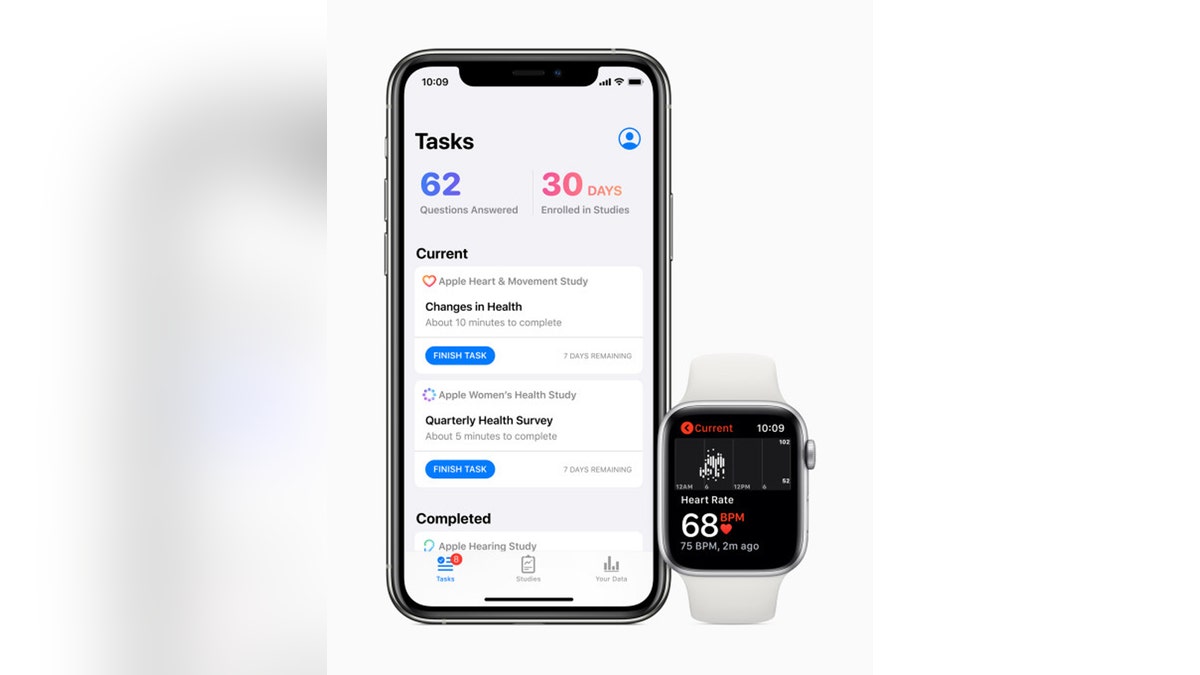Apple Watch, wearables show promise to help detect spread of coronavirus
{{#rendered}} {{/rendered}}Get all the latest news on coronavirus and more delivered daily to your inbox. Sign up here.
Apple Watch and WearOS devices can detect early signs of infection, according to research, which could lead to wearables joining the fight to stop the spread of the coronavirus pandemic.
Cardiogram, which provides a heart rate monitor app for the Apple Watch, Garmin and WearOS by Google, said that in the wake of the coronavirus pandemic, heart rate monitoring may be an “additional tool,” along with other conventional monitoring methods.
{{#rendered}} {{/rendered}}This could determine how your body responds to an infection, according to a blog post from Cardiogram's director of business development Harish Kilaru.

(Credit: Apple)
NEW CORONAVIRUS TEST CAN RETURN RESULTS IN FIVE MINUTES
One indication a person is getting sick is an elevated heart rate, said Kilaru, citing data from Cardiogram co-founder, Johnson Hsieh, who contracted the flu in January. Hsieh had a much higher average heart rate during sleep when he had symptoms like fever, body aches and coughing.
{{#rendered}} {{/rendered}}This happens when a person contracts a virus, such as influenza, as immune cells try to fight off infection by releasing proteins called histamines. This leads to blood vessels expanding, resulting in inflammation, and triggers symptoms like body aches and fever.
In response, white blood cells and proteins move into the damaged tissues to battle the infection. This signals to the brain to increase the heart rate and pump more blood, Kilaru explained.
“Although we’re still in the early stages of using consumer wearables to fully predict infections, heart rate monitoring is a tool you can use to observe your body’s response to the flu, with the added benefit of continuous data tracking,” Kilaru wrote.
{{#rendered}} {{/rendered}}This is supported by a study at San Diego-based Scripps Research, as well as a study that appeared in The Lancet, a weekly peer-reviewed general medical journal.
The goal of the Scripps Research study is to “identify areas with viral outbreaks quickly” and provide an early warning to give public health officials “more time to take action,” according to a description of the study.
Participants in the Scripp’s “DETECT” health study will be able to track their resting heart rate and anonymously share this information with the researchers.
{{#rendered}} {{/rendered}}The study published in The Lancet aims to find out if trends of seasonal respiratory infections, such as the flu, can be identified through wearable sensors that collect resting heart rate (RHR) and sleep data.
It obtained “de-identified” sensor data from 200,000 individuals who used a Fitbit wearable device in the U.S. from March 1, 2016, to March 1, 2018.
CLICK HERE FOR COMPLETE CORONAVIRUS COVERAGE
{{#rendered}} {{/rendered}}“By accessing these data, it could be possible to improve real-time and geographically refined influenza surveillance. This information could be vital to enact timely outbreak response measures to prevent further transmission of influenza cases during outbreaks,” a summary of the study states.
Fitbit, taking another tack, is trying to track the spread of the virus by studying the decline in average steps taken, according to a company blog post.
As of Friday morning, more than 1.51 million coronavirus cases have been diagnosed worldwide, more than 462,000 of which are in the U.S., the most impacted country on the planet.
{{#rendered}} {{/rendered}}
